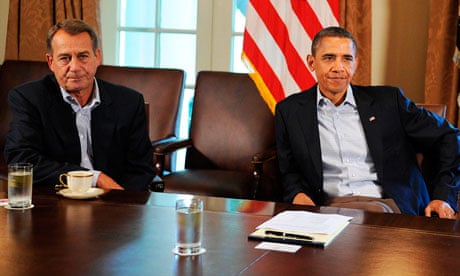Many analysts and pundits are trying to figure out who the public is blaming for the shutdown. All the pre-shutdown polling indicated that people were more likely to hold Republicans accountable than Democrats, but it also shows a majority of Americans think both sides are doing a bad job. Put another way: no side is winning, one side is just losing by less.
More Americans disapprove than approve of the job being done by all three actors in the dispute over the federal budget. President Obama comes out "ahead" in the ABC News/Washington Post poll with a -9pt approval rating. Both parties in Congress are much lower. Democrats in Congress manage to maintain a net approval of -22pt, while Republicans in Congress fall to a -37pt approval rating. These are all awful.
CNN/ORC tries to get at the question slightly differently, yet their data yield a similar result. When given the opportunity, Americans don't like either side. Of Americans who would blame either President Obama, or Republicans in Congress, or both, in the event of a shutdown, 62% blame Republicans. President Obama is on slightly better ground, but still 52% afford him some blame.
This extends to the overall political atmosphere in Washington, DC these days. Just a quarter of Americans believe the country is heading in the right direction per a recent Bloomberg poll – the lowest recorded by Bloomberg's pollster since the company's first poll in 2009. With both parties holding sway in at least part of a branch of elected government, it's no wonder that Americans seem at a loss for which side to chastise. Now, with the shutdown, both parties are spiraling to new lows in the minds of the public.
A new CNN/ORC poll puts the net favorability rating of the Democratic party at -9pt: its lowest since CNN started asking the question in 2006. Republicans, too, are at their lowest level since 2006 as well, with -30pt favorability. A large portion of the difference between the parties' favorability is that Tea Party supporters are less likely to hold a favorable view of Republicans than Tea Party opponents are of Democrats.
The numbers are much worse for members of Congress. A new Quinnipiac survey has the Democrats in Congress sporting a -28pt approval rating. Republicans are even worse, at a -57pt net approval rating. Again, much of the difference between the two parties' ratings is that much of the conservative base doesn't think that congressional Republicans are conservative enough.
Putting together the disapprovals of both sides, it leads to a congressional net approval rating of -77pt in the latest CNN survey. That's down 19pt since the beginning of the month, and it's the worst CNN has recorded since 2006.
The executive branch is in a somewhat better position, though only because the White House's disapprovals don't stink quite as much. President Obama has a -9pt net approval rating per CNN. That's tied with his worst levels during the debt ceiling debate in 2011, and marks a continuation of his year-long decline.
So, our hypothetical voters are left with a choice between undesirables. It's possible that these unwanted choices become even more intolerable over the course of the shutdown, though history suggests otherwise.
Even if the shutdown proves not to move public opinion significantly, the current atmosphere is far from sunny. Now, does this mean that voters will fight back and elect third-party or independent candidates? Almost certainly not. The United States is a two-party system. There have been other instances where Americans weren't happy with one or both parties, yet the structure held.
The fact is, we have a choice between Democrats and Republicans. Voters don't like either side, but this distaste will likely continue to manifest itself only in their opinions, and not in their underlying voting habits.
